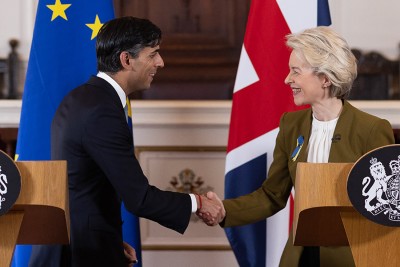

The United Kingdom has had a more constructive relationship with European institutions since Rishi Sunak (pictured here with European Commission president Ursula von der Leyen) became Prime Minister.Credit: Dan Kitwood/Getty
The celebrations were audible on both sides of the English Channel; relief in the United Kingdom and the rest of Europe that UK scientists can now participate in Horizon Europe, the world’s largest research-funding scheme, and the Europe-wide Copernicus Earth observation programme.
The UK government’s brief announcement at 7 a.m. on 7 September was accompanied by an extensive list of positive testimonials from research leaders. “Thrilled”; “delighted”; “excellent”; “huge”, they variously said.
Scientists celebrate as UK rejoins Horizon Europe research programme
At Nature, we, too, are relieved and overjoyed by the decision, which should not have taken so long to make. Our troubled world, with ‘polycrises’ of environmental degradation, economic headwinds and threats to peace and security, needs UK researchers to collaborate with colleagues in Europe and elsewhere now more than ever.
Accession to the €95.5-billion (US$102-billion) scheme will cost the United Kingdom €2.6 billion a year. This was always going to be a tough ask, given the considerable negative sentiment towards the European Union in the current UK administration. The decision was hanging in the balance as recently as July but, thankfully, the arguments in favour of joining won the day.
UK Prime Minister Rishi Sunak is reported to be unconvinced of the benefits. One of the arguments against joining was that the United Kingdom had already missed the programme’s first 2.5 years of funding — started in 2021, the scheme will last until 2027. Moreover, continuing delays to joining the programme would have made it harder for UK researchers to join or lead multi-year projects.
Although talks between the two sides had resumed in April, just days later, UK officials announced a collaborative scheme called Pioneer that was intended “to strengthen the UK’s position as a science and technology superpower”. The reaction of UK science leaders to the proposal was overwhelmingly negative and some publicly voiced fears that accession to Horizon Europe might not happen.
Horizon Europe turmoil changed the lives of these five scientists
Around three-quarters of Horizon Europe’s funds are allocated to global challenges and innovation. Already, nearly 40,000 researchers in 142 countries are taking part, many with long-standing links both to the programme and to each other. It would simply not have been possible for the United Kingdom to have matched the power, reach and depth of such a scheme had it chosen to go it alone.
When Brexit formally took effect on 31 January 2020, this journal urged the United Kingdom and the EU to “cherish what you have achieved and stay close”. The years since have shown how not to do that. The number of EU researchers working in the United Kingdom has plummeted and some UK scientists who had won Horizon Europe grants have had to give them up. Most UK universities are in the process of decoupling from European higher-education regulatory standards. The country has also left the European student-exchange scheme Erasmus+. The UK government’s replacement, the Turing scheme, funds young people in the United Kingdom to study, travel and work anywhere in the world for up to a year — but, unlike with Erasmus+, there is no money for young people to come to the United Kingdom.
What happened last week is a huge, valuable and immensely reassuring win — not only for research, but also for what such collaborations can achieve. However, with the issues threatening the world in mind, it is only a first step. Collaboration and openness are key to progress. Thanks to this decision, UK, European and international researchers can once again strengthen and deepen their ties — and contribute to solving the world’s challenges.








